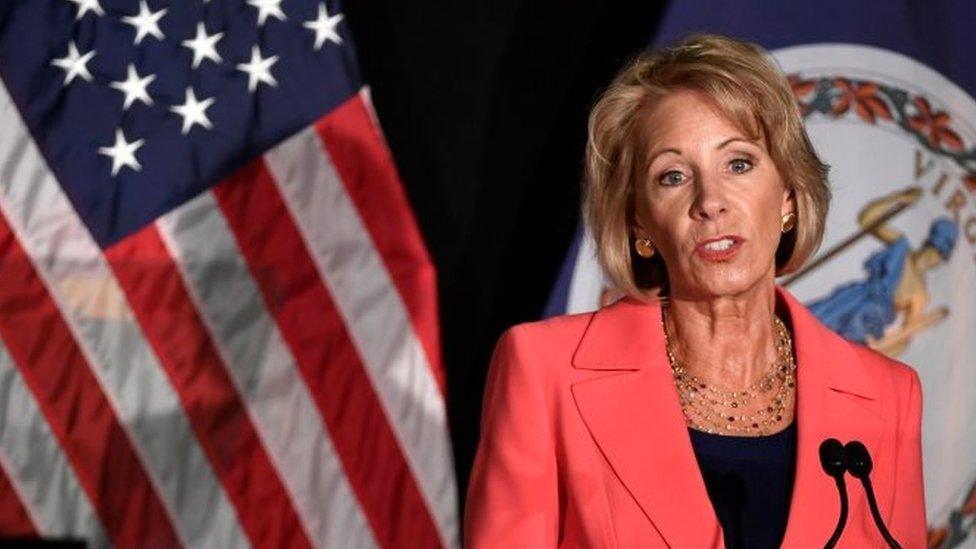US to overhaul university campus sexual assault policy
- Published

Betsy DeVos has not yet given details on how the guidelines will be changed
The US education department is planning to rewrite Obama-era rules on sexual assault on university campuses, Education Secretary Betsy DeVos says.
She said any new guidance on sexual assault must take into account both the rights of victims and the accused.
The move signals a shift in how universities enforce Title IX, the federal law barring discrimination in education based on gender.
Current rules will remain in place until a full review is conducted.
The Obama-era rules have sparked debate in recent years in how universities handle the use of Title IX in sexual assault cases.
"The era of 'rule by letter' is over," Mrs DeVos said on Thursday, referring to the Obama administration guidance from six years ago.
The Department of Education's Office for Civil Rights (OCR) sent a letter to school districts college and university administrators in 2011, pushing them to combat sexual harassment and sexual assault.
The 19-page letter, which began with the words "dear colleague," contended that sexual violence falls under sexual harassment, which is prohibited under Title IX.
It said the government would withhold federal funding from schools found to be mishandling sexual assault complaints.
Women's rights advocates praised the move as a major step in combating sexual violence, but critics said it had violated the due process rights of the accused.
During a speech at George Mason University in Virginia, Mrs DeVos called the Obama-era guidelines a "failed system" that had done a "disservice to everyone involved".
"Instead of working with schools on behalf of students, the prior administration weaponised the Office for Civil Rights to work against schools and against students," she said.
Julia Dixon has filed a complaint against her university for the way it handled her sexual assault case.
She said the definition of sexual assault was too broad and that too many cases involved "students and faculty who have faced investigation and punishment simply for speaking their minds or teaching their classes".
Mrs DeVos, however, noted that acts of sexual misconduct are "reprehensible, disgusting, and unacceptable".
"Every survivor of sexual misconduct must be taken seriously. Every student accused of sexual misconduct must know that guilt is not predetermined," she continued. "These are non-negotiable principles."
She said she would seek public input from colleges and universities in replacing the rules with a new policy.
The announcement sparked outrage among advocacy groups for sexual assault victims.
Allow X content?
This article contains content provided by X. We ask for your permission before anything is loaded, as they may be using cookies and other technologies. You may want to read X’s cookie policy, external and privacy policy, external before accepting. To view this content choose ‘accept and continue’.
Fatima Goss Graves, president and CEO of the National Women's Law Center, told the AP news agency Mrs DeVos' remarks "signal a green light to sweep sexual assault further under the rug".
Meanwhile, advocates for the accused hailed Mrs DeVos' announcement.
"Six and a half years of this failed policy have left us with a system that victims still don't trust and that the accused have every reason to believe is stacked against them," said Robert Shibley, external, the executive director of the Foundation for Individual Rights in Education.
"It's time to rescind the 'Dear Colleague' letter and replace it through the lawful regulatory process so that everyone can have a say."